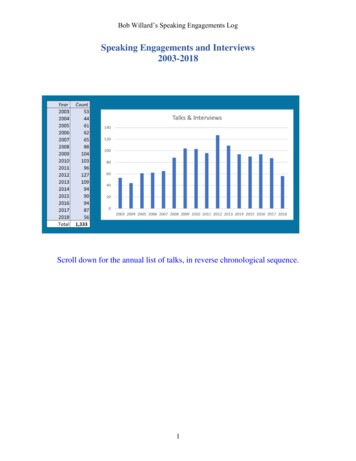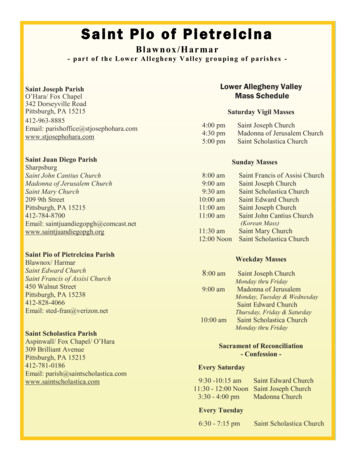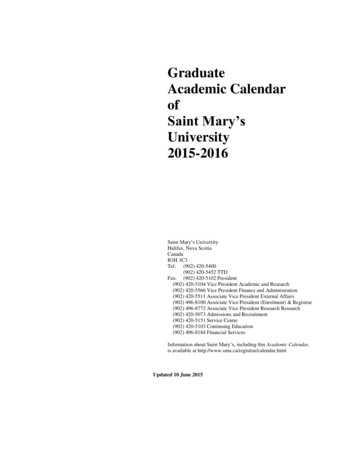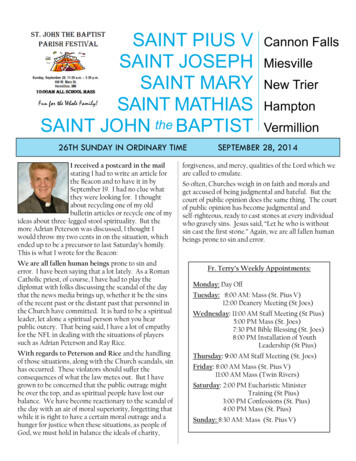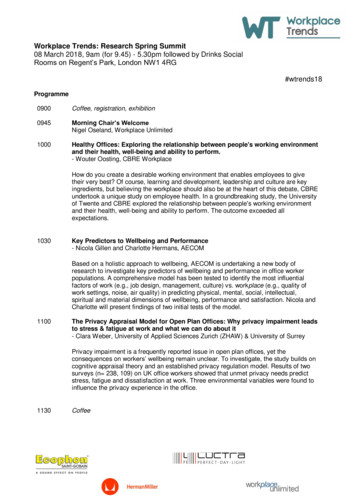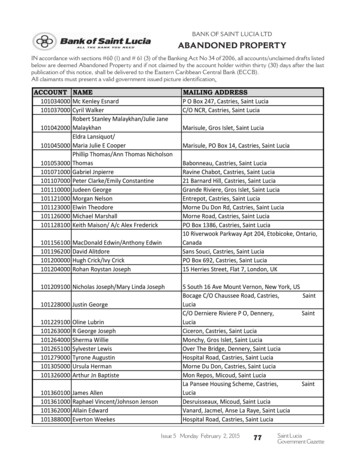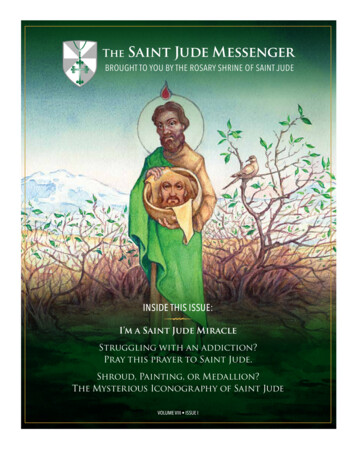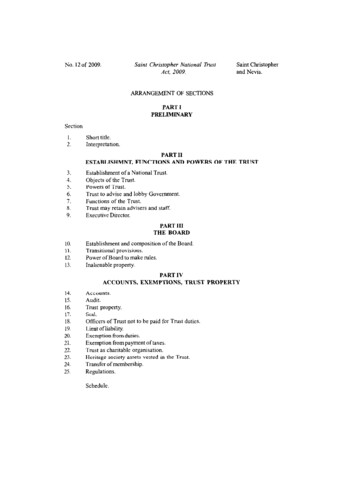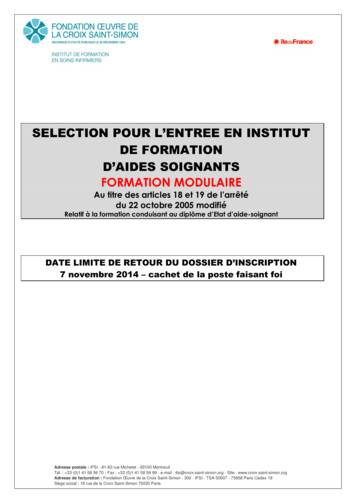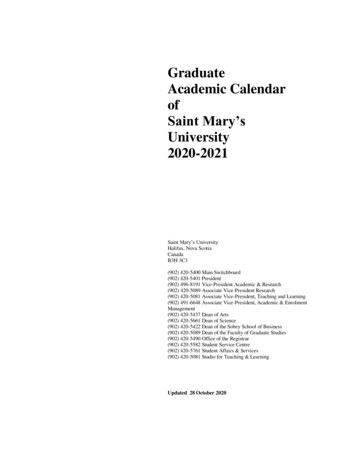
Transcription
GraduateAcademic CalendarofSaint Mary’sUniversity2020-2021Saint Mary’s UniversityHalifax, Nova ScotiaCanadaB3H 3C3(902) 420-5400 Main Switchboard(902) 420-5401 President(902) 496-8191 Vice-President Academic & Research(902) 420-5089 Associate Vice-President Research(902) 420-5081 Associate Vice-President, Teaching and Learning(902) 491-6648 Associate Vice-President, Academic & EnrolmentManagement(902) 420-5437 Dean of Arts(902) 420-5661 Dean of Science(902) 420-5422 Dean of the Sobey School of Business(902) 420-5089 Dean of the Faculty of Graduate Studies(902) 420-5490 Office of the Registrar(902) 420-5582 Student Service Centre(902) 420-5761 Student Affairs & Services(902) 420-5081 Studio for Teaching & LearningUpdated 28 October 2020
2 A Brief GuideA Brief Guide to Using this Academic CalendarSaint Mary’s University publishes a separateUndergraduate Academic Calendar.The University’s Calendar is prepared to provideauthoritative on the numerous academic offered. Thefollowing was prepared to assist in finding relevantmaterial in this Calendar.Inquiries regarding academic matters should be directed tothe Registrar.Some of the courses described in this Calendar will not beoffered in 2020-2021. Students are therefore advised toconsult the academic timetable for those courses which willbe taught in the 2020-2021 academic year and the time(s)when they will be offered. The timetable can be found athttp://selfservice.smu.caFrequently in this Calendar, the masculine includes thefeminine and the plural includes the singular, and viceversa, as the context may require. This matter is subject toongoing revision.Section 3 of this book sets forth the requirements for themany degree, diploma, and certificate programs offered atSaint Mary’s University.These programs include:International Master of Teaching EnglishMaster of Applied Health Services ResearchMaster of Arts in Atlantic Canada StudiesMaster of Arts in CriminologyMaster of Arts in GeographyMaster of Arts in HistoryMaster of Arts in International Development StudiesMaster of Arts in PhilosophyMaster of Arts in Theology and Religious StudiesMaster of Arts in Women and Gender StudiesMaster of Applied EconomicsMaster of Business AdministrationMaster of Business Administration (CMA)Master of Business Administration (CPA)Master of FinanceMaster of Management - Cooperatives and Credit UnionsGraduate Diploma in Co-operative ManagementExecutive Master of Business AdministrationMaster of Science in Applied PsychologyMaster of Science in Applied SciencesMaster of Science in AstronomyMaster of Science in Computing and Data AnalyticsMaster of Technology Entrepreneurship and InnovationDoctor of Philosophy in Business Administration(Management)Doctor of Philosophy in Applied ScienceDoctor of Philosophy in AstronomyDoctor of Philosophy in Industrial/OrganizationalPsychologyDoctor of Philosophy in International DevelopmentStudiesThe following undergraduate programs can be found in theUndergraduate Academic Calendar.Bachelor of ArtsBachelor of CommerceBachelor of ScienceBachelor of Environmental StudiesDiploma in EngineeringDiploma in Forensic SciencesCertificates of Honours EquivalencyCertificate in Atlantic Canada StudiesCertificate of Chinese StudiesCertificate of Proficiency in FrenchCertificate of German StudiesCertificate of Human Resource ManagementCertificate of LinguisticsCertificate in Mathematical Sciences for EducationCertificate of Japanese StudiesCertificate of Spanish Language and Hispanic Culture
Table of Contents 3ContentsA Brief Guide to Using this Academic CalendarContents.2SECTION 1 - GENERAL INFORMATIONCalendar of Events.5SECTION 2 - ACADEMIC REGULATIONSAcademic Integrity and Student Responsibility .Academic Regulations .Admissions.Registration.Program of Study and Research.Evaluation and Grading.Academic Standing.Convocation and Academic Records.Research Ethics Board.101414161822252830SECTION 3 - FACULTIES AND PROGRAMSArtsM.A. in Atlantic Canada Studies.M.A. in Criminology.M.A. in Geography.M.A. in History.M.A. and Ph.D. in International DevelopmentStudies.M.A. in Philosophy.M.A. in Theology and Religious Studies.M.A. in Women and Gender Studies.German – Canadian Summer School inGermany.Sobey School of BusinessMaster of Applied Economics Executive MBA.Master of Business Administration.Master of Business Administration – CPA Master of Finance.Master and Graduate Diploma of Cooperatives and Credit Unions.Master of Technology Entrepreneurship andInnovation.Ph.D. in Business cienceM.Sc. and Ph.D. in Astronomy.M.Sc. in Computing and Data Analytics M.Sc. and Ph.D. in Psychology.M.Sc. in Applied Science.Ph.D. in Applied Science.100104107111121EducationInternational Master of Teaching English .124Research CentresMaster of Applied Health Services Research129
GeneralInformationCalendar of EventsSection1
Calendar of Events 5ACADEMIC CALENDAR OF EVENTS2020-2021Registration - Details on registration for the 2020-2021 academic year will be published on theService Centre’s webpage www.smu.ca/servicecentre in March 2020.2020May11 (Monday)13 (Wednesday)14 (Thursday)11 - 16 (Monday- Saturday)18 (Monday)June1 (Monday)9 (Tuesday)22 (Monday)23 – 24 (Tuesday- Wednesday25 – 27 (Thursday- Saturday)July1 (Wednesday)6 (Monday)8 (Wednesday)9 (Thursday)August3 (Monday)4 (Tuesday)5 (Wednesday)17 (Monday)18 – 19 (Tuesday- Wednesday)20 – 22 (Thursday- Saturday)Summer Sessions begin for graduate and undergraduate courses.Last day for registering and changing courses in the spring term(a) Last day for dropping courses in the spring term (May – June).(b) Last day for final payment of spring term tuition fees.Spring Convocation Week.Administrative Offices closed. No classes – Victoria Day.Deadline for filing applications for fall 2020 Convocation.Last day for withdrawing, without academic penalty, from spring term(Reference: Academic Regulation 16).Last day of classes in First Summer Session (spring term-Undergraduate).Study Days. No Classes.Formal final examination period. Spring term ends.Administrative Offices closed. No classes – Canada Day.Second Summer Session (Undergraduate) classes begin.Last day for registering and changing courses in the summer term(a) Last day for dropping courses in the summer term (July – Aug).(b) Last day for final payment of summer term tuition fees.Administrative Offices closed. No classes – Natal Day.Deadline for filing applications for winter 2021 ConvocationLast day for withdrawing, without academic penalty, from summer term(Reference: Academic Regulation 16).Last day of classes in Graduate Summer Session and in Second SummerSession (summer term-Undergraduate).Study DaysFormal final examination period. Summer term ends.
Calendar of Events 6September7 (Monday)8 (Tuesday)9 (Wednesday)22 (Tuesday)25 (Friday)Administrative Offices closed. No classes - Labour Day.Academic year begins.CLASSES BEGIN.Last day for registering and changing courses in the fall term(September – December).(a) Last day for dropping courses in the fall term (September –December).(b) Last day for final payment of fall term tuition fees.Fall Convocation.October1 (Thursday)12 (Monday)Deadline for filing applications for spring 2021 Convocation.Administrative Offices closed. No classes - Thanksgiving Day.25 (Friday)November9 - 15 (Monday- Sunday)11 (Wednesday)19 (Thursday)December8 (Tuesday)9 (Wednesday)10 - 11 (Thursday- Friday)12 (Saturday)22 (Tuesday)2021January4 (Monday)6 (Wednesday)12 (Tuesday)Fall Break. No classes.Administrative Offices closed. No classes – Remembrance Day.Last day for withdrawing, without academic penalty, from three (3) credithour or six (6) credit hour courses taught only in the fall term (Reference:Academic Regulation 16).Patronal Feast of the University. Administrative Offices closed. Regularclass day.Last day of classes in fall term.Study Days. No classes.Start of formal final examinations in three (3) credit hour courses andformal mid-year examinations in six (6) credit hour courses.End of final exams and end of the fall term. Note: Subject to changeshould it not be possible to schedule all formal examinations in thedesignated timeframe. 29 (Friday)Administrative Offices open. Academic year resumes.CLASSES RESUME.Last day for registering and changing courses in the winter term(January – April).(a) Last day for dropping courses in the winter term (January –April).(b) Last day for final payment of winter term tuition fees.Winter Convocation.February15 (Monday)Administrative Offices closed. No classes - Heritage Day.15 (Friday)
Calendar of Events 715 - 21 (Monday- Sunday)22 (Monday)March15 (Monday)April2 (Friday)4 – 5 (Sunday- Monday)7 (Wednesday)8 - 9 (Thursday Friday)10 (Saturday)20 (Tuesday)May3 (Monday)5 (Wednesday)6 (Thursday)17 - 22 (Monday- Saturday)24 (Monday)Winter Break. No classes.Last day for withdrawing, without academic penalty, from six (6) credithour courses taught from September to April (Reference: AcademicRegulation 16).Last day for withdrawing, without academic penalty, from three (3) credithour courses or six (6) credit hour courses taught only in the Winter term(Reference: Academic Regulation 16).Administrative Offices closed. No classes - Good Friday.Administrative Offices closed. No classes - Easter Sunday and Monday.Last day of classes in winter term.Study day. No classes.Start of formal final examinations.End of formal final examinations and end of the winter term. Note:Subject to change should it not be possible to schedule all formalexaminations in the designated timeframe.Summer Sessions begin for graduate and undergraduate courses.Last day for registering and changing courses in the spring term(a) Last day for dropping courses in the spring term (May – June).(b) Last day for final payment of spring term tuition fees.Spring Convocation Week.Administrative Offices closed. No classes – Victoria Day.June1 (Tuesday)2 (Wednesday)Deadline for filing applications for fall 2021 Convocation.Last day for withdrawing, without academic penalty, from spring term(Reference: Academic Regulation 16).14 (Monday)Last day of classes in First Summer Session (spring term-Undergraduate).15 - 16 (Wednesday Study Days. No Classes.- Thursday17 - 19 (FridayFormal final examination period. Spring term ends.- Saturday)July1 (Thursday)5 (Monday)7 (Wednesday)Administrative Offices closed. No classes – Canada Day.Second Summer Session (Undergraduate) classes begin.Last day for registering and changing courses in the summer term.8 (Thursday)(a) Last day for dropping courses in the summer term (July – Aug).(b) Last day for final payment of summer term tuition fees.
Calendar of Events 8August2 (Monday)3 (Tuesday)4 (Wednesday)16 (Monday)17-18 (Tuesday- Wednesday)19-21 (Thursday- Saturday)Administrative Offices closed. No classes – Natal Day.Deadline for filing applications for winter 2022 Convocation.Last day for withdrawing, without academic penalty, from summer term(Reference: Academic Regulation 16).Last day of classes in Graduate Summer Session and in Second SummerSession (summer term-Undergraduate).Study DaysFormal final examination period. Summer term ends.
Academic Integrity andStudent ResponsibilitySectionAcademic Regulations2
Academic Integrity and Student Responsibility 10Academic Integrity and Student ResponsibilityAcademic Integrity(Academic Regulation 33)Saint Mary’s University is committed to upholding academicintegrity and adopts the following statement of values:decisions based on the pursuit of truth, and the honestsearch for knowledge.All members of the academic community conductthemselves with integrity in learning, teaching and research.An academic community flourishes when its members arecommitted to these fundamental values:Our conduct as community members should protect andpromote the University’s pursuit of the advancement ofresearch and scholarship.1. RESPECT: An academic community of integrity strivesfor a community where individual growth of all membersis advanced through the cultivation of mutual respect inan atmosphere of academic freedom.7. SAFETY: Members of the academic community will notendanger others, intentionally or recklessly. When situationsarise where someone is in danger we will strive to act toalert the person, or the proper authorities to the danger.We strive to create an environment where everyonerecognizes their responsibility to respect the rights ofother members of the university community, and nurturesa climate of respect, fairness, and civility toward otherswhile embracing each individual’s dignity, freedom, anddiversity.Adapted From - The Saint Mary’s University ‘Declaration ofRespect’. For further information and resources tml2. COMMUNICATION: In an academic community ofintegrity, it is acknowledged that a shared point of view isnot always possible, and that civil debate and discourse isnecessary for intellectual growth even in the face ofdisagreement.Through respectful and vigorous discussion and debate,individual freedoms may flourish without threatening theprivileges or freedoms of others.As new and emerging technologies changecommunication, the commitment is to be mindful of thesafety, privacy, and confidentiality of both others andourselves.3. RESPONSIBILITY & ACCOUNTABILITY: Personalbehavior and actions have consequences. All members ofthe academic community commit to the responsibleenjoyment and exercise of their rights, with respect for therights of others.All members of the academic community will betrustworthy and answerable for their conduct, decisions,and obligations, and will comply with all applicable laws,regulations, policies and procedures.4. STEWARDSHIP: An academic community of integrityvalues their community’s property, infrastructure, andresources as assets that allow them to accomplish theirwork. All members of the academic community will useuniversity resources ethically and in a wise and prudentmanner in order to achieve our educational mission andstrategic objectives.5. EXCELLENCE & LEADERSHIP: An academiccommunity of integrity knows that through scholarlyinquiry, academic freedom improves through working andlearning together.6. HONESTY & INTEGRITY: An academic communityof integrity acts and communicates truthfully and candidlyas they uphold the university’s values and makesSaint Mary’s University is committed to maintaining ascholarly institution where all may come together for thecommon purpose of learning.University students are expected to have a reasonablemeasure of self-discipline and maturity. While theUniversity’s teaching resources are available for help andguidance, and instructors and staff will make reasonableefforts to assist students with academic or other problems,the final responsibility for success or failure in academicstudies rests with the students.At times there may be considerable pressure to achieve highgrades. Some students may be tempted to obtain grades bydishonest means. The integrity of the University and of thedegrees it awards are compromised by practices such ascheating and plagiarism. The University does not condonesuch acts under any circumstances and will take appropriatedisciplinary action.Saint Mary's University expects that students will conductthemselves in compliance with University Regulations andPolicies, Departmental Policies, and Federal, Provincial andMunicipal laws, as well as codes of ethics that governstudents who are members of regulated professions. TheCode of Student Conduct (found on the University website)outlines the behaviors which the University considers to benon-academic misconduct offences, and the range ofremedies and/or sanctions which may be imposed.Examples of Academic OffencesThese are examples of academic offences that may justifyinvestigation and discipline under this Policy. This list is notexhaustive, but should guide students in understandingexpectations and those responsible for enforcing this Policy.Plagiarism – The presentation of words, ideas or techniquesof another as one's own. Plagiarism is not restricted toliterary works and applies to all forms of information orideas that belong to another (e.g., computer programs,mathematical solutions, scientific experiments, graphicalimages, or data).
Academic Integrity and Student Responsibility 11Examples of plagiarism include: quoting, paraphrasing, or summarizing text without properacknowledgment; paraphrasing too closely (e.g., changing only a few wordsor simply rearranging the text); downloading all or part of a paper, journal article, or bookfrom the Internet or a library database and presenting it asone's own work; purchasing documentation and presenting it as one's ownwork; sharing papers or parts of papers including the selling ofessays, tests, or other assignments.Assisting someone in the commission of dishonest behavioras it relates to academic integrity is an offence subject tosanctions.Cheating – The attempt to secure a grade by unethicalmeans. Knowingly assisting someone to cheat is itselfcheating.Examples of cheating include: impersonating someone during a test or exam; copying or sharing information during a test or exam; using or possessing unauthorized materials (e.g., notes,books, calculators) during a test or exam; obtaining or looking at a copy of a test or exam before it isadministered; improper use of technology (e.g., electronic devices tostore and retrieve information during an exam); unauthorized use of communication technology (e.g.: cellphones, pagers, etc.); unauthorized use of material, including test banks; unauthorized collaboration between students whenindividual work is required. submitting the same work for credit in more than onecourse without the permission of the instructors involved; any behavior intended to gain unearned advantage. former or current students providing unacceptable orforbidden support on exams, tests, assignments, etc.When a member of the University community (faculty, staff,or student) believes that an academic offence has beencommitted, they shall file an Incident Report within 15working days from the time the incident has been identified.The Report must identify and provide evidence of thealleged offence. The Incident Report will be forwarded tothe AIO of the Faculty in which the incident occurred.Falsification – It is an offence to falsify any academicrecord or to use a falsified record.Examples of falsification include: submitting a false excuse for missing a class, exam, etc.(e.g., forging a medical or death certificate); falsifying course work (e.g., altering or making up data,using fake citations in a bibliography); changing the answers on a returned assignment andresubmitting it to be reevaluated; submitting false information on a university admissionform or other documentation; misrepresentation of knowledge of a language byproviding inaccurate or incomplete information aboutone’s linguistic educational history; non-disclosure of previous post-secondary enrolment; presentation of another’s credentials as one’s own.Tampering – It is an offence to tamper with Universitylibrary materials or computer system resources in any waywhich would deprive others of their use.Examples of tampering include: destroying, hiding, or stealing library materials; altering or destroying university computer programs orfiles without authorization; accessing and altering official records withoutauthorization.General ProceduresAcademic Integrity Officers and Academic DisciplineOfficerEach Dean will appoint an academic staff member to serveas the Academic Integrity Officer (AIO) and carry out theresponsibilities of this Policy within each Faculty.Reports must be on the form available from the Registrar’soffice at nt-report-form.html. The AIO is responsible forprocessing the complaint as follows:Upon receiving an Academic Integrity Incident report theAIO will: notify the Registrar who will advise the AIO as towhether this is the first incident of academicdishonesty for the student or students involved;collect additional evidence if necessary;communicate with the student, preferably inperson. Students should be encouraged to bringrepresentation in the form of a friend, peer orstudent advocate. The student should be advisedthat failure to meet with the AIO will result in thecase being referred to the Academic DisciplineOfficer (ADO). The student will also be advisedthat they cannot withdraw from the course inwhich there is an Academic Integrity chargeagainst them.The AIO will consider the evidence and determine whetherthere has been a violation of this Policy. If the AIOdetermines that there has been a violation of this Policy thatwarrants a Standard Sanction (see “Sanctions” below), theAIO will notify the student in writing of the AIO’s decisionand the specific sanction imposed normally within 10working days of the decision. A copy of the decision will beprovided to the Registrar, the Department Chair and theinstructor. The student will be informed of the student’sright to appeal (see “Appeals” below).If the AIO determines that there has been a violation of thisPolicy that warrants a Severe or Very Severe Sanction, theAIO must refer the matter to the ADO, with a summary ofthe AIO’s findings and a recommended Severe Sanction. .There should be no decision or notice of right to appeal untilthe sanction is determined by the ADO.
12 Academic Integrity and Student ResponsibilityAcademic Discipline Officer (ADO)The Academic Discipline Officer will be an academic staffmember or senior administrator appointed by the VicePresident, Academic and Research. Upon receipt of areferral from an AIO, the ADO may accept or reject therecommended Severe Sanctions and/or impose additionalsanctions. The ADO has the authority to recommend a VerySevere Sanction, but the decision to impose a Very SevereSanction is made by the Senate Executive.If the ADO imposes Severe Sanctions, the ADO will notifythe student in writing of the ADO’s decision and sanctionimposed. A copy of the decision will be provided to theRegistrar, the Department Chair, the instructor and the AIO.The student will be informed of the student’s right to appeal(see “Appeals” below).If the ADO recommends a Very Severe Sanction to theSenate Executive, the matter will be referred to the SenateExecutive, with a summary of the ADO’s findings andrecommended Very Severe Sanction. There should be nodecision or notice of right to appeal until the sanction isdetermined by the Senate Executive(a) a failure to follow the “rules of natural justice”,(b) a failure to follow University rules, regulations orpolicies.(c) compelling new evidence not considered by theAIO, ADO or Senate Executive which may have,in the opinion of the Chair of the Committee,altered an earlier decision(s);2.ProceduresInitiation of the Appeal1.The student or instructor may initiate an appeal underthis policy by delivering a Notice of Appeal to theRegistrar.2.The Registrar will forward the Notice of Appeal to:a.b.Senate Executivec.d.The Senate Executive may accept or reject the recommendedVery Severe Sanction(s). The student must be informed ofthe decision in writing and advised of his/her right to appeal.A copy of the decision will be provided to the Registrar, theDepartment Chair, the instructor, the ADO and the AIO.e.CompositionThe Senate Academic Discipline Appeal Committee iscomprised of six representatives of the faculty and tworepresentatives of the student body, and the person providingAdministrative Support for Academic Integrity Issues. Thefaculty representatives are elected by Senate for a three-yearterm. There shall be two faculty representatives from eachof the faculties of Arts, Business and Science, with no twofaculty representatives from the same Department. In casesinvolving a graduate student a faculty representativeappointed by the Dean of Graduate Studies and a graduatestudent representative will also attend. The studentrepresentatives shall be appointed by the Students’Association. The Chair of Senate will chair the Committee.Appointment of an Appeal Hearing PanelUpon receipt of a Notice of Appeal, the Registrar shall senda copy of it to the Chair of the Senate Academic DisciplineAppeal Committee. If the Chair, after consultation with aleast two Committee members, preferably one facultymember and one student, concludes that the appeal involvesa permissible ground for appeal as set out herein, an AppealHearing Panel shall be appointed by the Chair from themembers of the Committee to hear the appeal. An AppealHearing Panel is comprised of the Chair, two (2) Facultymembers, and one (1) student, and the person providingAdministrative Support for Academic Integrity Issues.Appeal Hearing Panel Procedure1.FunctionThe Senate Academic Discipline Appeal Committee shall:1.Hear appeals of decisions made pursuant to this Policybased only on one or more of the following grounds:Dean of the Faculty (or designate) fromwhich the original complaint emanated;The Chair of the Department from which theoriginal complaint emanated;The instructor who initiated the complaint;The Dean of the Faculty in which the studentis enrolled at the date of Notice of Appeal;andThe AIO, ADO or Senate Executive asappropriate.The Notice of Appeal shall be delivered not later thanten (10) working days from the date the decision beingappealed has been sent in writing to the student.Thereafter no appeal may be brought.APPEALSSenate Academic Discipline AppealCommitteeHave the responsibility to ensure the execution of itsdecisions.The Appeal Hearing Panel shall be convened to hearthe appeal as soon as practical, but not later than fifteen(15) working days after it is constituted or such laterdate as is acceptable to the student (appellant) andrespondent (AIO, ADO or representative for SenateExecutive)
Academic Integrity and Student Responsibility 132.The Appeal Hearing Panel shall determine itsprocedures subject to the following: completion of a remediation process.a.Severe Sanctions: Can only be imposed by ADO.b.c.d.all parties involved, including the instructor andDepartment Chair, shall be given adequate noticeand full opportunity to participate;the basis of the appeal shall be presented by theperson who made the appeal (the Appellant);evidence supporting or rebutting the appeal maybe given by witnesses;the hearing shall be in camera. The student isentitled to one observer.Disposition of the AppealThe Appeal Hearing Panel may, by a majority vote:a.b.c.d.deny the appeal;allow the appeal and quash the decisionentirely;allow the appeal but require a reevaluation on the merits by anotherperson or panel; ordeny the appeal on the merits but modifythe imposed sanctions.Copy of the DecisionWithin five (5) working days from the date the AppealHearing Panel has rendered its decision, the Registrar shallmail a copy of the decision to the student who initiated theappeal and to the persons mentioned in Section 2 ofInitiation of the Appeal, above;Compliance within Thirty (30) Calendar DaysWhere the Appeal Hearing Panel has determined that aperson or Faculty is to address or act upon a particularmatter, the person or Faculty shall within thirty (30) calendardays of when the decision has been communicated, advisethe Registrar of its compliance, or time table for compliance,with the decision.No Further AppealThe findings and ruling of the Academic Discipline AppealCommittee Appeal Hearing Panel shall be binding withoutfurther appeal.SanctionsThe AIO, ADO, Senate Executive, and Academic AppealHearing Panel may impose the following sanctions of anacademic nature and, without restricting the generality of theforegoing, may include any one or more of:Standard Sanctions: May be imposed by AIO or ADO a failing grade or mark or assessment in the coursecomponent triggering the discipline; reduction in grade in the course component triggering thediscipline; complete Academic Integrity training; repeat of the assignment that triggered the discipline; failure of the class or course; suspension or dismissal for an academic term or year (to amaximum dismissal of three (3) academic years); loss of current or continuing scholarship, or both, or lossof eligibility to receive or maintain scholarships, prizes orbursaries; removal from the Dean’s list; academic notation on transcript; reduction in grade in the class or course.Very Severe Sanctions: Can only be imposed by SenateExecutive: expulsion from the University; revocation of degree, certificate or diploma.NoticesAll notices required by this Policy or other communicationsto students and others as provided in this Policy will be sentto their “preferred” email listed in Banner at the time thedecision is made. Notices and communications sent via thisemail are deemed to have been received.
14 Academic Regul
Saint Mary's University 2020-2021 Saint Mary's University Halifax, Nova Scotia Canada B3H 3C3 (902) 420-5400 Main Switchboard (902) 420-5401 President (902) 496-8191 Vice-President Academic & Research (902) 420-5089 Associate Vice-President Research (902) 420-5081 Associate Vice-President, Teaching and Learning
